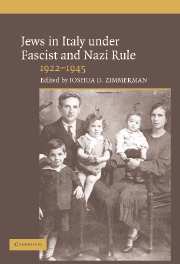Book contents
- Frontmatter
- Contents
- Acknowledgments
- Abbreviations
- List of Contributors
- Map 1. The Jews of Italy, 1938
- Map 2. Principal Centers of Anti-Jewish Persecution, 1938–1943
- Introduction
- Part One ITALIAN JEWRY FROM LIBERALISM TO FASCISM
- Part Two RISE OF RACIAL PERSECUTIONS
- Part Three CATASTROPHE – THE GERMAN OCCUPATION, 1943–1945
- Part Four THE VATICAN AND THE HOLOCAUST IN ITALY
- 14 The Papal Response to Nazi and Fascist Anti-Semitism: From Pius XI to Pius XII
- 15 Pius XII and the Rescue of Jews in Italy: Evidence of a Papal Directive
- Part Five AFTERMATH: CONTEMPORARY ITALY AND HOLOCAUST MEMORY
- Index
- Plates A–D
14 - The Papal Response to Nazi and Fascist Anti-Semitism: From Pius XI to Pius XII
Published online by Cambridge University Press: 22 September 2009
- Frontmatter
- Contents
- Acknowledgments
- Abbreviations
- List of Contributors
- Map 1. The Jews of Italy, 1938
- Map 2. Principal Centers of Anti-Jewish Persecution, 1938–1943
- Introduction
- Part One ITALIAN JEWRY FROM LIBERALISM TO FASCISM
- Part Two RISE OF RACIAL PERSECUTIONS
- Part Three CATASTROPHE – THE GERMAN OCCUPATION, 1943–1945
- Part Four THE VATICAN AND THE HOLOCAUST IN ITALY
- 14 The Papal Response to Nazi and Fascist Anti-Semitism: From Pius XI to Pius XII
- 15 Pius XII and the Rescue of Jews in Italy: Evidence of a Papal Directive
- Part Five AFTERMATH: CONTEMPORARY ITALY AND HOLOCAUST MEMORY
- Index
- Plates A–D
Summary
It is the task and duty of the Church, the dignity and responsibility of the Chief Shepherd and of his brother Shepherds whom the Holy Ghost has placed to rule the Church of God, that they should point out to mankind the true course to be followed, the eternal divine order in the changing circumstances of the times.
Some two decades ago, when I was commissioned to write a paper on the responses of popes Pius XI (Achille Ratti) and Pius XII (Eugenio Pacelli) to the Nazi and Fascist dictatorships (1922–45), I believed that the two followed similar policies. Ratti and Pacelli adhered to Benedict XV's (1914–22) dictum that it was a Christian's duty to submit to those in authority. At the same time, both favored the conclusion of concordats to ensure Vatican interests and the institutional Church, and neither hesitated to come to terms with authoritarian regimes. Between them they concluded more than fifty such agreements with democracies and dictatorships. The fact that neither proved able to reach an accommodation with the Soviet Union contributed to their overriding opposition to Communism. In the words of one author, Ratti and Pacelli were “of one mind in their hatred and fear of Bolshevism.” The two had worked closely for a decade with Pius XI calling upon Eugenio Pacelli, who later assumed the name Pius XII, to serve as his secretary of state in 1930.
- Type
- Chapter
- Information
- Jews in Italy under Fascist and Nazi Rule, 1922–1945 , pp. 265 - 286Publisher: Cambridge University PressPrint publication year: 2005

